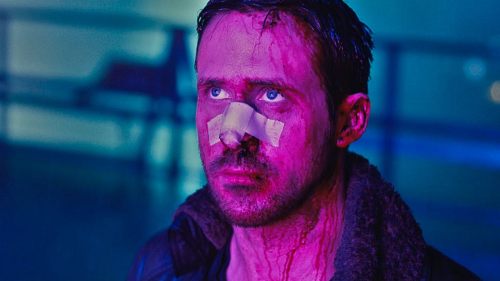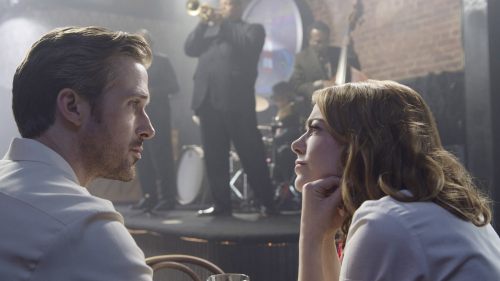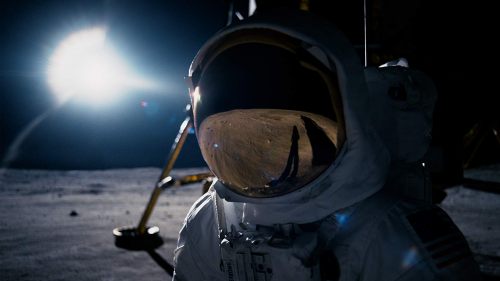Holland March: THE NICE GUY And World’s Worst Detective
In honor of La La Land, we're presenting a week of articles inspired by the film. You can buy your tickets here!
Regardless of how sad his undertaking was, at least The Swimmer’s broken Burt Lancaster still had the wherewithal to journey from pool to pool in his neighborhood — but private investigator Holland March is stranded, stuck, using his pool like the world’s biggest ashtray, passing out on the diving board because he’s drunk. It’s not even really his pool — he rents a house above his pay grade while he pretends to consider rebuilding his old house, which was destroyed by a fire — a fire that he was kind of responsible for, and that killed his wife, leaving his daughter Holly disenchanted by him at best.
In an old draft of Shane Black’s and Anthony Bagarozzi’s The Nice Guys, the villain asks March and enforcer Jackson Healy whether they’re what passes for knights in today’s world. The question is sarcastic, but the unspoken answer is weirdly, sincerely yes. Healy and March are knight errants, their damsel in distress a porn star, a smog-choked Los Angeles their Camelot. And Holland March, although more vulnerable and flawed than the characters who preceded him, might come pretty damn close to the Platonic ideal of Shane Black characters.
The Nice Guys have been around since 2001, co-written by Shane Black and Anthony Bagarozzi after Black had finished writing Kiss Kiss Bang Bang. The script has evolved, changed shape: first Black and Bagarozzi tried it as a feature set in the present day about a sex tape, then it was a TV show for CBS, and then HBO, and finally in 2010 Joel Silver got on board, and the script was retooled to take place in the ‘70s. Somehow a movie that had been struggling for over a decade came together in a period of 72 hours — Ryan Gosling read the script because he loved The Monster Squad and signed on as Holland March, and Russell Crowe decided to commit to the character Jackson Healy because Gosling was attached.
Setting the story in 1977 seemed to be the magic that made The Nice Guys finally work. If Raymond Chandler and Philip Marlowe helped shape and inspire Kiss Kiss Bang Bang, then it’s Stephen J. Cannell and The Rockford Files (1974 – 1980) we should thank for The Nice Guys. It goes deeper than the film’s references to Rockford, which include the gun that March keeps in his cookie jar, his yellow pages ad, even charging the same rate as Rockford: $200 a day plus expenses. But much of Holland March’s DNA comes from Jim Rockford, an ex-con private eye who likes to avoid conflict and worries about his bills. The show was almost as tough to sell as The Nice Guys — ABC hated it and told Cannell, “you can’t have a hero that quits every time he’s threatened, you can’t have a hero who runs credit checks on a client, his own father thinks he’s a jerk for being a private eye. Take all that out and we’ll shoot it.” But like Black and Silver, Cannell had an ally in his producer Roy Huggins. Huggins loved it, and thankfully, so did the show’s star James Garner.
The Rockford Files and its success allowed a character like Holland March to exist. “You can forget about cataloging my virtues. I hold them to a minimum so they’re easy to keep track of,” Rockford said, the epigraph of at least one iteration of The Nice Guys script. Cannell once explained the appeal of Jim Rockford’s character: “Nobody likes a perfect person.” Cannell allowed his characters to be imperfect, and with Jim Rockford, he created television’s first antihero, though it might be more correct to call him a reluctant hero.
Healy, March, Rockford — they’re all knight errants in the tradition of private detectives like Travis McGee, Philip Marlowe, Lew Archer. McGee excepted, these characters share a city, too: Los Angeles, a place where porn thrived against the backdrop of a smog-encrusted city as the Hollywood sign crumbled in the 1970s. It’s a city where fantasy and reality converge in sometimes jarring, even devastating ways. The porn king Savage Sid’s party is a perfect example: a creepy guy in a Pinocchio costume named “Pornookio” greets guests, ushering them into a world of mermaids, unicorns, and marijuana, where Sid himself has been murdered, a fucked-up fairytale. The Waltons are America’s favorite family — but in this world, John Boy kills people. And The Nice Guys opens with a kid looking at Misty Mountains posing in a porn mag, and seconds later a naked, bleeding, dying Misty crash-lands in his backyard where he covers her up with his pajama shirt before the police arrive.
Holly March (Angourie Rice) recognizes reality — she sees through the card trick and knows how it’s done — but she still waits for her father to live up to the fantasy. She may have written “you will never be happy” on Holland’s hand but she hasn’t given up on him being a good father or a good detective. To Holly, a fan of Agatha Christie and Nancy Drew, the detective is an ideal to aspire to — even Healy believes it’s a noble profession, before he meets March, believing maybe he should “…become a P.I. Those guys help people. Maybe then I’d feel good in the morning.” But March is a schmuck, “the world’s worst detective”. Jim Rockford was a falsely accused, wrongly imprisoned con man, but March toes that line, his outgoing voicemail recorded with easy-to-follow instructions for his elderly and easily duped clientele. And he’s already failed Holly once in a spectacular way: by ignoring her mother when she noticed a gas leak because he can’t smell.
Despite Holly’s disappointment in them, she sees these men as fundamentally good. Even the Blue Man, who tried to kill her. Even Jackson Healy, who killed the Blue Man and lied to her about it. This lie haunts Jackson Healy — she’s their conscience. It’s not that Healy or March want to be heroes, exactly. To Jackson Healy, stopping a shotgun maniac in a diner affected him because “just for a moment [he] felt useful.” In that moment, he matters to other people, and to himself. Corruption runs deep in The Nice Guys: the mob, corporate America, Detroit automakers, the Department of Justice. But ultimately March and Healy strive to protect innocence, and to repair a broken family — Amelia and her mother (Margaret Qualley and Kim Basinger) — just as they form their own kind of makeshift family with Holly.
A few film critics perceived the end of The Nice Guys as cynical, a shrug, feeling that no real change happened. But The Nice Guys revolts against the noir’s sense of fatalism, or at least finds a little light in noir’s darkness. Something between March and Healy occurred, something as important as shaking up the system. Two people who were once strangers shared an adventure, deeply-flawed men who might not have believed there was any good left in them, who didn’t have any friends at all. What took place may seem small to us compared to the corruption they uncovered, but to March and Healy, it was everything. And maybe that’s the lesson of The Nice Guys: even a brief moment of heroism is still heroism, even if it’s just to one other guy or to a little girl whose pinky promise you stayed true to, even if it doesn’t make it into history books — it matters. Maybe the sun goes up, the sun goes down, and it feels like nothing’s changed. But at the end of the day, you can still share a joke, a drink, and a new case. You can still rediscover hope, be a hero, be useful.



